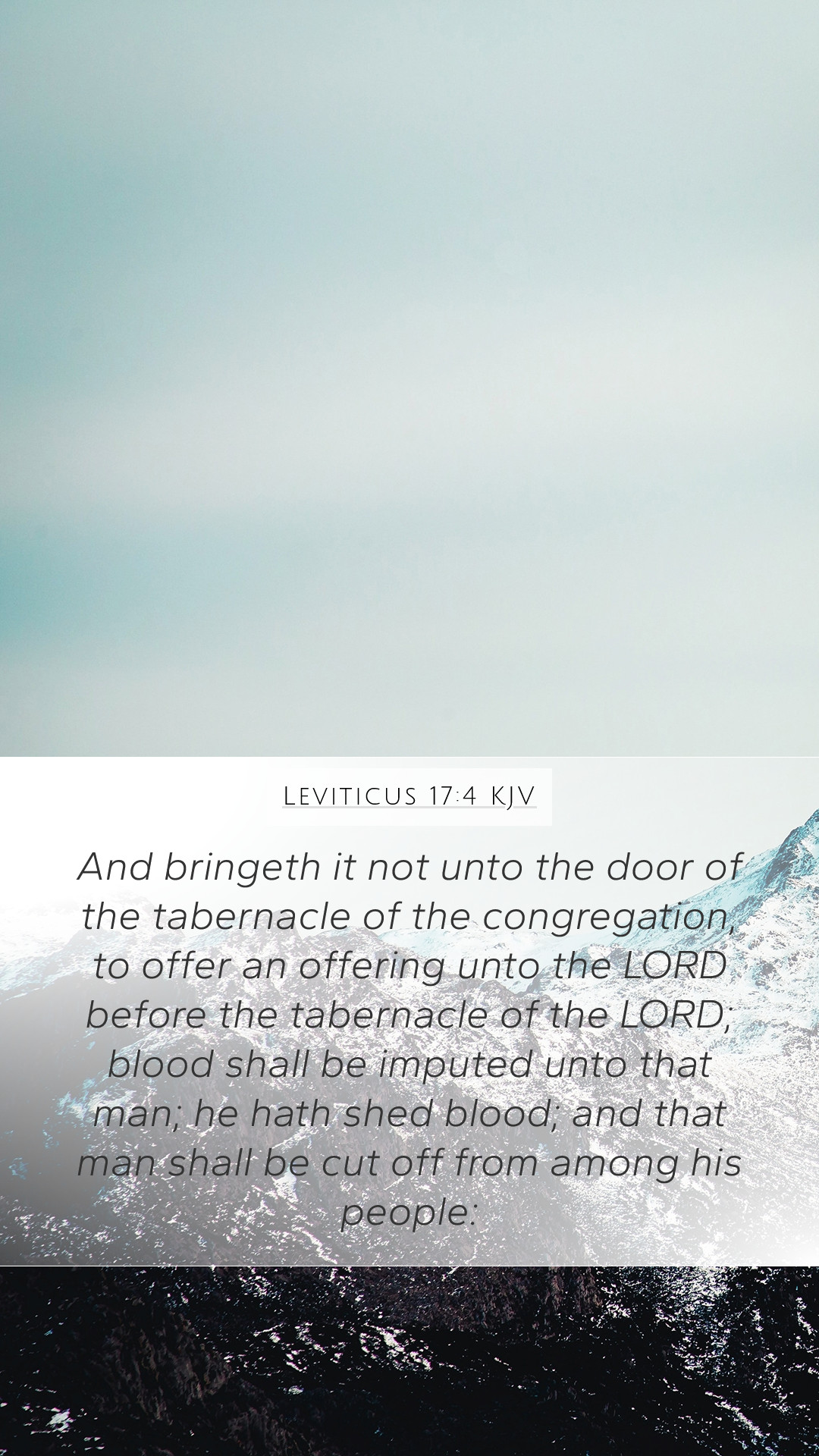Bible Verse Commentary: Leviticus 17:4
The verse Leviticus 17:4 states, “And brings it not unto the door of the tabernacle of the congregation, to offer it an offering unto the Lord; blood shall be imputed unto that man; he hath shed blood; and that man shall be cut off from among his people.” This verse serves as a critical directive in the Levitical Laws, emphasizing the importance of where and how sacrifices are to be made.
Understanding the Context
This verse is nestled within the regulations concerning sacrificial rites, specifically those governing the place of these offerings. Leviticus is a book that outlines various laws for the Israelites, aiming to guide them in their worship and daily living. Sacrifices were central to the faith, signifying atonement, thanksgiving, and communal worship.
Matthew Henry’s Commentary Insights
Matthew Henry notes that the prohibition against sacrificing anywhere other than at the tabernacle highlights the seriousness of bloodshed and how it relates to the sanctity of sacrificial offerings. He explains that blood represents life, and thus, its proper handling reflects on the community's dealings with God.
Albert Barnes’ Explanation
Albert Barnes elaborates that this command was given to ensure that the Israelites understood the sacredness associated with the sacrifices they made. The notion that blood shall be imputed upon the one who does not comply with this instruction underscores the severe consequence of disregarding God's regulations.
Adam Clarke’s Commentary
Adam Clarke delves into the implications of not adhering to this command. He states that failing to bring the offering to the designated location indicates a lack of respect for God’s appointed means of worship, leading to the communal alienation of the offender—effectively stating that such actions could lead to being “cut off” or excluded from the community of believers.
Theological Implications
This verse emphasizes several theological points:
- Holiness of God: The need for proper conduct in worship underscores the holiness of God and the gravity with which He views sacrificial acts.
- Community and Responsibility: The consequences of improper sacrifices reflect the collective responsibility of the Israelites towards maintaining purity and order within the community.
- Foreshadowing Christ: In a broader theological framework, the blood signifies atonement, leading followers to recognize the ultimate sacrifice of Christ, represented by the shedding of His blood.
Practical Applications
While Leviticus 17:4 is situated in an ancient context, its teachings yield practical insights for modern believers:
- Respect for Worship: Believers today should regard their worship and service to God with seriousness, ensuring that it is conducted according to His intentions.
- Understanding Sacrifice: The importance of the blood in the offering should lead us to appreciate the sacrificial death of Jesus and what it represents.
- Community Integrity: Just as the actions of one influenced the entire community then, Christians are reminded that their actions can uplift or tear down the body of Christ today.
Related Bible Verses
For a more expansive understanding, consider these related cross-references:
- Exodus 12:13: The significance of the blood in the Passover event.
- Leviticus 4:27-31: Instructions on unintentional sin offerings.
- Hebrews 9:22: The necessity of blood for forgiveness.
- Romans 6:23: The wages of sin and the gift of God.
- John 1:29: Jesus as the Lamb of God who takes away the sin of the world.
Conclusion
In summary, Leviticus 17:4 invites us to reflect on the significance of sacrificial offerings and the sacredness associated with them. Through the commentaries of Matthew Henry, Albert Barnes, and Adam Clarke, we gain a well-rounded understanding of the seriousness of proper worship and the theological implications that transcend the historical context. Engaging with this verse allows for deeper Bible verse understanding and Bible verse interpretation for personal application and spiritual growth.


